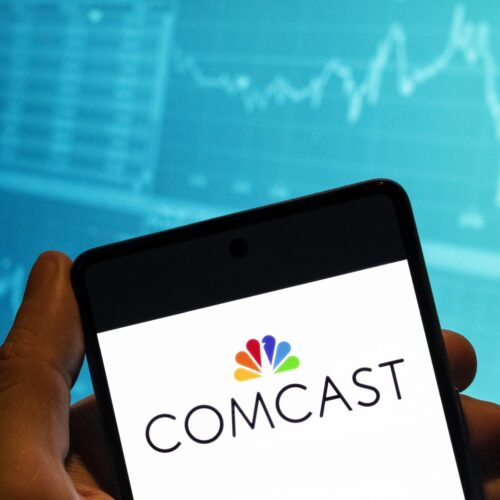Media insiders expect an M&A deal frenzy next year. These 6 companies could be in the mix.

Getty Images
- Media and entertainment insiders expect an uptick in industry M&A in 2025.
- Comcast and Skydance Media's deals could unleash more activity.
- Insiders identified the deals they think are most likely to happen in 2025 and beyond.
With several buzzy media and entertainment deals already planned for 2025, industry insiders say next year could see a flurry of M&A activity.
Bankers and investors largely expect Trump's return to the White House will be favorable for dealmaking and are rubbing their hands together in anticipation of a big year ahead.
"Every banker that has pay-TV is crunching the numbers," said Jonathan Miller, CEO of Integrated Media, which invests in digital media. Miller sees media at an inflection point that could accelerate M&A. Now that streaming TV businesses are maturing, owners of linear TV channels can start to think about hiving off that no-growth business.
A big player here is Comcast, which announced in November that it would spin off most of its NBCUniversal cable channels, including CNBC, MSNBC, and E!, into a new SpinCo. That new entity plans to grow in part by acquiring other cable channels, so the move is widely expected to trigger other deals.
A second potential trigger of M&A is Skydance Media's long-awaited merger with Paramount Global. This will combine David Ellison's production company, known for hits like "Top Gun: Maverick," with Paramount's assets, including a storied movie studio, CBS News, and cable networks like MTV and Nickelodeon. Paramount is expected to get rid of assets alongside the merger.
Both the Comcast and Paramount deals are expected to close in the second half of 2025.
Another big theme that could pave the way for deals is the continued fallout of Peak TV's end, which industry insiders expect to continue to winnow the number of independent TV suppliers. Look for more production companies to shut down or combine, as in the recent merger of LeBron James' sports-focused SpringHill with Fullwell 73, the production company behind "The Kardashians."
While Big Tech has become a major player in entertainment and, increasingly, sports rights, don't look to them to be the savior of struggling media and entertainment companies.
"The tech companies have realized they could get the milk without buying the cow," said Alex Iosilevich, partner at Alignment Growth, which invests in media and entertainment. "You see it with the sports rights. You don't need to buy Warner to get the next NBA rights."
Business Insider spoke with half a dozen media and entertainment investors, bankers, and advisors who speculated about the deals they think could happen in 2025 and beyond. Some of the people were granted anonymity to protect business relationships; their identities are known to BI.

Paramount Network
It's taken as a given in the industry that Paramount will pare down, as it's tried to do for years, now that its Skydance merger is imminent and the company is poised to install former NBCUniversal CEO Jeff Shell at the helm.
Co-CEO George Cheeks has said the company is evaluating sales of assets to shave $500 million in costs, which could include BET Media and the Paramount Pictures lot. (It's already been in talks to sell BET to a group led by CEO Scott Mills.) Leaders have insisted they're keeping CBS. But Paramount's networks face the same tough market as the rest of the linear landscape.
Some see Showtime as a prime target for Starz, the cable network that's shifting to streaming with its imminent spinoff from studio Lionsgate. Starz could be on the hunt for assets to help it bulk up.

: Charles Sykes/NBCUniversal via Getty Images
NBCU executive Mark Lazarus, who will be SpinCo's CEO, has talked it up as a buyer. It certainly has options. It could look no further than Paramount, which has already hung a for-sale sign on assets, or Warner's grab bag of channels like TBS or TLC. Another potential target is AMC Networks, the prestigious but sub-scale network and streamer (though it specializes in the type of TV dramas that have largely migrated to streaming).
SpinCo could also be a seller. Some also think SpinCo could be bought entirely by a private-equity firm further down the road. SpinCo may have to wait a couple of years to sell itself to avoid a tax liability anyway.

HBO
Warner Bros. Discovery recently announced that it would split into two divisions in 2025, signaling M&A options are on the table. One will house the growing digital streaming and studio businesses, and the other will consist of its declining legacy television networks. WBD needs the cash from its linear channels to pay down its still-considerable debt, but separating the good from the bad could help it sell some assets.
Industry insiders have predicted WBD could do anything from adding Paramount's linear channels or Comcast's SpinCo — considering Warners' debt, it could happen in a stock-for-stock swap — to selling properties like CNN that aren't core to its streaming business. And depending on how the Murdoch succession plays out, a longer-term play could be to buy Fox assets. With scale still the coin of the realm, Warners has to eat or be eaten.

Murray Close/Moviepix/Getty Images
Now that Lionsgate is separated from Starz, it's widely seen as a candidate for sale, something Anson Funds Management, an activist investor, is pushing for.
"I don't think they'll be independent in 2026," one banker said.
There'd be no shortage of buyers for Lionsgate, as it's one of the last independent Hollywood studios out there. Its massive library includes "John Wick," "The Hunger Games," and "Twilight."
Paramount or WBD could snap it up for its library, though they wouldn't necessarily want its distribution or management business. Legendary Entertainment (home to "Dune" and "Godzilla") and its major investor Apollo Global Management, as well as Sony, were previously said to all be interested in Paramount, so they could be potential buyers for Lionsgate. Some also see Fox in the market for a studio, as it sold its TV and movie studios to Disney in 2019.
And while Big Tech has generally preferred to build than buy, Amazon has shown an openness to acquiring, having put down $8.5 billion for MGM Studios three years ago.

Chip Somodevilla via Getty Images
That leaves the other legacy media giant: Disney.
About a year ago, CEO Bob Iger floated the idea of selling Disney's TV and cable properties like ABC, but he's since retreated from it. The company line was that Disney wouldn't get the price it wanted and that it'd be too complex to separate them from the rest of the company. Iger and Trump have also sparred in the past, and Disney could look to avoid deals that need government approval.
That said, Iger could change his mind, and now that its streaming business sees a path to ongoing profitability, he seems to have more options. Disney could entertain selling its TV networks like ABC, which it doesn't need to fuel its streaming business. And Disney, without its linear TV business, could be more valuable to a potential buyer, should it decide it's better off selling itself.
One industry player mused that Disney could sell Hulu+ Live TV, its cable-like TV package, and exit the distribution business.

Reuters
Roku has been a beneficiary of the continued shift of viewers to streaming, with smart TVs in 85 million homes. Needham recently got Roku in the conversation again with a note predicting it could be sold in 2025, now that Walmart has closed its sale of TV maker Vizio. Needham analysts think anyone from Netflix to The Trade Desk could be interested in Roku as a way to build their streaming ad business, while a retailer like Target could see Roku as a way to use TV ads to drive shopping.
Lara O'Reilly contributed reporting.


